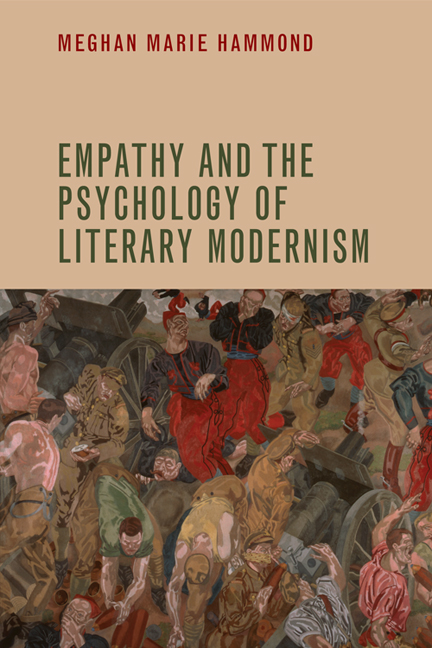Book contents
- Frontmatter
- Contents
- Acknowledgements
- Abbreviations
- Introduction: The Problem of Other Minds and the Fin de Siècle World
- 1 Into Other Minds: William and Henry James
- 2 Dorothy Richardson's Modernist Innovation
- 3 Communities of Feeling in Katherine Mansfield's Fiction
- 4 Empathy and Violence in the Works of Ford Madox Ford
- 5 Virginia Woolf and the Limits of Empathy
- Coda: New Structures of Fellow Feeling
- Bibliography
- Index
4 - Empathy and Violence in the Works of Ford Madox Ford
Published online by Cambridge University Press: 05 August 2016
- Frontmatter
- Contents
- Acknowledgements
- Abbreviations
- Introduction: The Problem of Other Minds and the Fin de Siècle World
- 1 Into Other Minds: William and Henry James
- 2 Dorothy Richardson's Modernist Innovation
- 3 Communities of Feeling in Katherine Mansfield's Fiction
- 4 Empathy and Violence in the Works of Ford Madox Ford
- 5 Virginia Woolf and the Limits of Empathy
- Coda: New Structures of Fellow Feeling
- Bibliography
- Index
Summary
In the early months of World War I, Ford Madox Ford wrote in one of his ‘Literary portraits’ for Outlook,
we are fighting to answer the question whether it is right to thank God for the deaths of a million fellow-beings. Is it then right? Is it then wrong? I don't know. I know nothing anymore; nobody knows anything. We are down in the mud of the trenches of right and wrong, grappling with each other's throats, gouging out each other's eyes. (Ford 2004: 211)
Seven months later, Ford was on his way to France as a second lieutenant in the British Army. There he would see first-hand the overwhelming violence of the Somme and the Ypres Salient. Readers familiar with Ford's fiction will recognise his words here. They echo the continual claims to ‘know nothing’ that John Dowell makes as narrator of The Good Soldier, which was first released in its entirety in 1915, two months after the Outlook piece. This passage also repeats what is perhaps the most disturbing image in The Good Soldier, a work brimming with suicide, deception and psychological cruelty. Toward the novel's end, Dowell considers his friends Edward, Leonora and Nancy and reflects, ‘I think that it would have been better in the eyes of God if they had all attempted to gouge out each other's eyes with carving knives’ (GS 158). This striking image is at the psychological and emotional core of Ford's modernism, which I read as a deeply ambivalent exploration of empathic thinking and feeling.
In this chapter, I examine empathy in The Good Soldier (1915) and A Man Could Stand Up– (1926), the third volume of Ford's Parade's End tetralogy (1924–8).1 The influential empathy theories of Vernon Lee, Wilhelm Worringer and T. E. Hulme, which circulated in Ford's pre-war social circle, help me consider how Ford participates in and enriches early twentieth-century discourses of fellow feeling. I am interested not only in Ford's contribution as one of the guiding critical voices of literary modernism, but also in what he adds as a veteran of World War I, a conflict that was understood as an unprecedented challenge to imagination and perspective sharing. What is particularly notable about Ford, I suggest, is the way his work incorporates, and perhaps even reconciles, competing notions of empathy in its attempts to represent psychological and physical violence.
- Type
- Chapter
- Information
- Empathy and the Psychology of Literary Modernism , pp. 118 - 147Publisher: Edinburgh University PressPrint publication year: 2014



